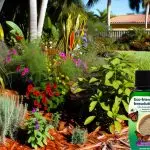If you’re looking to control pests in your South Florida landscape naturally, consider using oils like thyme, cinnamon, peppermint, and rosemary. These oils have strong insecticidal properties and can be easily mixed with water for application. Other effective options include lemongrass, neem oil, garlic juice, and cedar oil, all of which repel or disrupt pests without toxic chemicals. They offer sustainable solutions for your garden and promote healthier ecosystems. These natural alternatives not only manage pests effectively but also help protect beneficial insects. You might be surprised by what else you can use to keep your garden thriving.
Key Takeaways
- Thyme, cinnamon, and peppermint oils effectively target common pests like mites and aphids, promoting a healthier ecosystem in gardens.
- Geraniol and neem oil disrupt insect nervous systems and growth, providing a broad-spectrum solution against various pests in humid climates.
- Lemongrass and citronella oil are excellent natural repellents against mosquitoes and flies, enhancing outdoor comfort without harmful chemicals.
- Soybean oil and garlic juice suffocate soft-bodied insects and repel pests, respectively, offering budget-friendly, homemade pest control options.
- Cedar oil and rosemary oil effectively target mosquitoes and various other insects, supporting sustainable gardening practices and a pest-free environment.
Thyme Oil
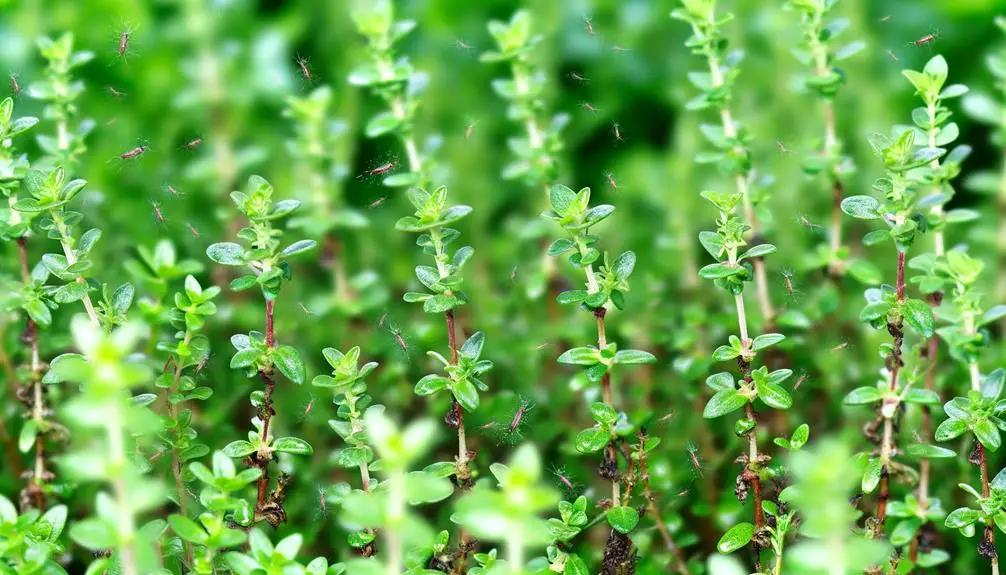
Thyme oil, derived from the leaves of the Thymus vulgaris plant, is a potent natural remedy for controlling various pests. If you’re looking to create a thriving garden that feels alive and free from unwanted visitors, thyme oil might just be your new best friend. Its insecticidal properties make it a fantastic choice for pest control, allowing you to take charge of your outdoor spaces without relying on harsh chemicals. With the growing trend towards natural and organic pest control solutions, incorporating thyme oil into your pest management routine can be both effective and environmentally friendly.
When you use thyme oil, you harness the power of essential oils, which have been praised for their effectiveness in managing pests. Its acaricidal activity means it can specifically target mites, providing a holistic approach to pest management. You’ll find that incorporating thyme oil into your routine not only helps protect your plants but also fosters a sense of community among fellow gardeners who are enthusiastic to share their experiences.
To use thyme oil effectively, mix it with water and a natural emulsifier, then spray it directly on affected plants. You’ll be amazed at how quickly it works against insects that threaten your garden. Plus, the lovely aroma can enhance your gardening experience, creating an inviting atmosphere for you and your loved ones.
Embrace the benefits of thyme oil and become part of a growing movement focused on sustainable pest control. By choosing this natural solution, you contribute to healthier ecosystems while enjoying the beauty of your garden, free from the worry of chemical residues.
Cinnimon Oil
Cinnamon oil, extracted from the bark of the Cinnamomum tree, is a powerful ally in your fight against pests. This essential oil boasts impressive insecticidal properties, making it an excellent choice for natural pest control in your South Florida landscape. When you use Cinnamomum oil, you’re not just applying a pest deterrent; you’re embracing a holistic approach that aligns with the growing trend of sustainable gardening. In addition to its pest-fighting qualities, cinnamon oil complements eco-friendly practices, such as those promoted by NaturePest’s commitment to environmentally friendly solutions.
One of the main benefits of cinnamon oil is its ability to disrupt the life cycles of various pests. Whether you’re dealing with ants, spider mites, or other unwanted insects, this natural oil can help keep them at bay. Its strong aroma also acts as a repellent, ensuring that pests think twice before invading your space.
To use cinnamon oil effectively, mix it with water and a few drops of a mild soap to create a spray solution. Apply it directly to the affected areas in your garden, focusing on the leaves and stems where pests tend to gather. You’ll appreciate how easy it is to incorporate this essential oil into your pest control routine.
Pepermint Oil
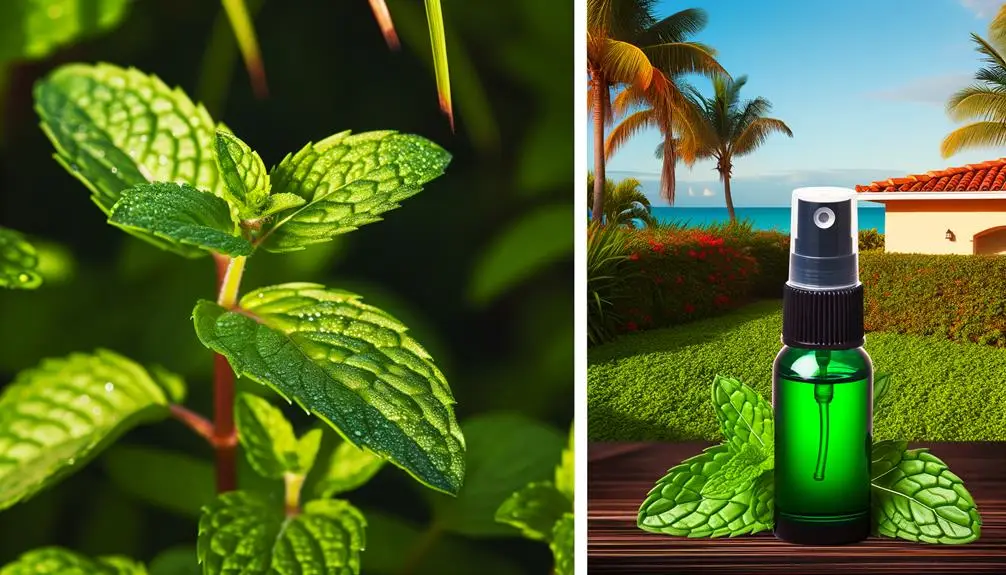
Peppermint oil is a potent natural remedy for pest control that can be easily integrated into your gardening routine. This essential oil boasts impressive insecticidal properties, making it a favorite among gardeners looking to reduce harmful pests without resorting to harsh chemicals. Its effectiveness against common pests like aphids, mites, and scale insects is well-documented, further solidifying its place in sustainable gardening. When you apply peppermint oil, its strong scent not only refreshes your garden but also acts as a deterrent against a variety of common pests, such as aphids, spiders, and even mice.
One of the standout features of peppermint oil is its acaricidal activity, which means it effectively targets mites and ticks. By using this oil, you’re not just protecting your plants; you’re also fostering a healthier ecosystem in your garden. You can create a simple spray by mixing peppermint oil with water and a few drops of dish soap. This mixture can be applied directly to affected plants, ensuring pests are kept at bay.
As you embrace the power of peppermint oil, you’ll find that it strengthens your connection to nature while promoting a pest-free environment. Join others in your community who are choosing natural solutions for pest control, fostering a sense of belonging and shared responsibility for the health of your landscapes. With peppermint oil, you’re taking a step towards sustainable gardening practices that benefit both your plants and the environment around you. So, give it a try, and watch your garden thrive!
Rosemary Oil
When it comes to natural pest control, rosemary oil stands out as a powerful ally in your gardening toolkit. This essential oil isn’t just aromatic; it boasts impressive insecticidal properties that make it effective against a range of pests. NaturePest, a holistic pest control service, emphasizes the importance of using natural methods for pest management, making rosemary oil a great fit for those seeking organic pest control solutions. Whether you’re dealing with aphids, spider mites, or other unwanted visitors, incorporating rosemary oil into your pest management routine can make a significant difference.
The magic of rosemary oil lies in its potent active compounds, which not only repel pests but also exhibit acaricidal activity. This means that it can effectively target those troublesome mites that often wreak havoc on your plants. By using rosemary oil, you’re not only protecting your garden but also embracing a natural approach that aligns with sustainable gardening practices.
To harness its benefits, simply mix a few drops of rosemary oil with water and a mild soap in a spray bottle. Shake it up and apply it directly to the affected plants. You’ll find that this natural remedy not only helps in pest control but also leaves your garden smelling wonderful.
Joining the community of gardeners who prioritize eco-friendly solutions is rewarding. By choosing rosemary oil, you’re taking a step towards healthier plants and a more sustainable environment. So, next time you notice pests in your garden, remember that rosemary oil is a simple, effective, and natural tool at your disposal. Embrace the power of essential oils and watch your garden thrive!
Lemongrass

Lemongrass is a fantastic option for natural pest control, especially if you’re looking for an effective way to deter insects while adding a revitalizing scent to your garden. This aromatic plant, known for its essential oils, contains compounds that exhibit strong insecticidal properties, making it a valuable ally in your pest management strategy.
When you grow lemongrass, you’re not just enhancing your garden’s fragrance; you’re also harnessing its biological activity to combat common pests. The essential oils derived from lemongrass can repel mosquitoes, flies, and other unwanted insects, helping to create a more pleasant outdoor space for you and your loved ones.
You can use lemongrass in various ways for pest control. Planting it around your garden or patio can create a natural barrier against pests. Alternatively, you can extract its essential oils and mix them with water to create a spray that you can apply directly to affected areas. This approach not only provides effective pest control but also guarantees you’re using a non-toxic solution that’s secure for children and pets.
Incorporating lemongrass into your pest management routine connects you to a community of like-minded individuals who value natural solutions. By opting for lemongrass and its essential oils, you’re embracing a sustainable approach to gardening that promotes harmony with nature while keeping your landscapes pest-free.
Citronella Oil
Have you ever noticed how citronella oil can transform your outdoor experience? This essential oil, derived from the leaves of the Citronella grass, is a powerful ally in pest control. It’s not just about creating a pleasant aroma; citronella oil boasts impressive insecticidal properties that can help keep bothersome bugs at bay. When you’re hosting a gathering or simply enjoying your backyard, the last thing you want is to be swarmed by mosquitoes or other unwanted visitors.
Citronella oil works effectively as a natural repellent, utilizing its unique scent to deter insects. Its acaricidal activity particularly shines against ticks and mites, making it a versatile choice for those looking to embrace natural solutions in their landscapes. You’ll find that incorporating this oil into your gardening routine can foster a more secure, more enjoyable outdoor environment for you and your loved ones.
To use citronella oil, consider mixing it with a carrier oil for topical application or adding it to candles and diffusers for a fragrant barrier against pests. You’ll not only enhance your outdoor gatherings but also connect with nature in a meaningful way. By choosing natural options like citronella oil, you’re joining a community invested in sustainable pest management. So, next time you’re preparing for an outdoor occasion, remember the power of citronella oil in your pest control arsenal; it could be the key to a peaceful evening under the stars.
Clove Oil
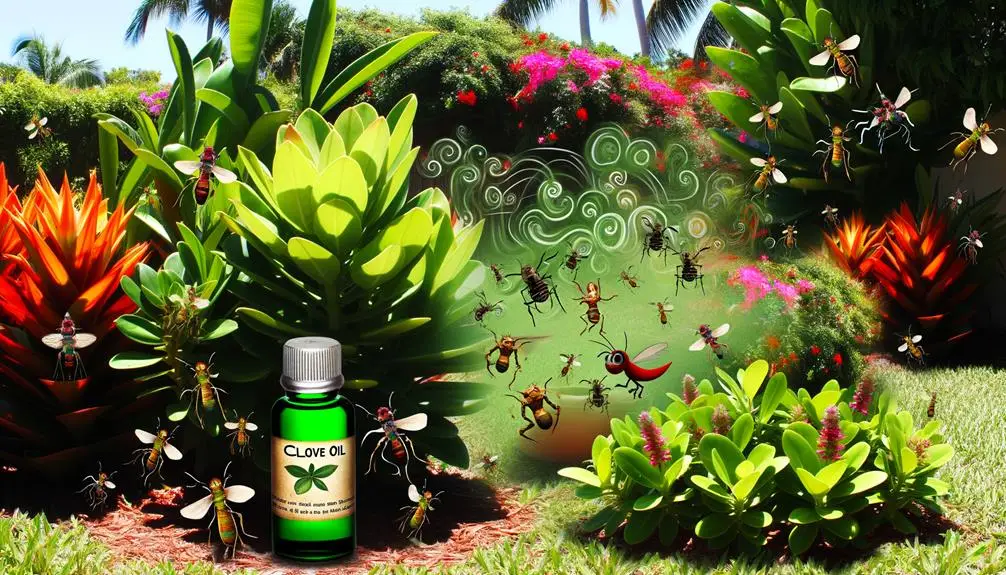
Clove oil stands out as a potent natural remedy for pest control, especially when you want to keep insects away without resorting to harsh chemicals. This essential oil, derived from the flower buds of the clove tree, boasts impressive insecticidal properties. You’ll find that using clove oil not only helps in repelling bothersome insects but also targets them effectively.
When you apply clove oil, its acaricidal activity comes into play, making it particularly effective against mites and other crawling pests. This means you can confidently use it in your garden, knowing it works to combat unwanted visitors while being secure for your plants and the environment. The oil’s strong aroma is unappealing to many insects, which makes it a great option for those looking to create a pest-free space.
Incorporating clove oil into your pest control routine is simple. You can mix it with water or other natural oils and spray it directly onto affected areas. This not only enhances your home’s appeal but also fosters a sense of community among fellow gardeners who value eco-friendly solutions.
Geraniol
Geraniol, a naturally occurring monoterpenoid, is gaining recognition for its effectiveness in pest control. You’ll find this compound in various essential oils, especially those derived from citronella, lemongrass, and geranium plants. What makes geraniol stand out is its potent insecticidal properties, which can help you manage troublesome pests in your garden or landscape with a more natural approach.
When you use geraniol, you’re tapping into its acaricidal activity, which effectively targets mites and other harmful arthropods. It’s a friendly option for those who want to reduce their reliance on synthetic pesticides while still achieving effective pest control. By incorporating geraniol into your pest management routine, you’re not just protecting your plants; you’re also contributing to a healthier ecosystem.
Studies have shown that geraniol works by disrupting the nervous system of insects, leading to paralysis and eventual death. This makes it a powerful ally in your quest for a pest-free environment. Plus, its pleasant fragrance can make your outdoor space more enjoyable for you and your family.
Incorporating geraniol into your pest control arsenal means you’re choosing a sustainable and environmentally friendly method. So, whether you’re battling mosquitoes or tackling stubborn spider mites, consider essential oils with geraniol to maintain a thriving, healthy landscape. You belong to a community that values natural solutions, and using geraniol is a step in the right direction.
Gerinol
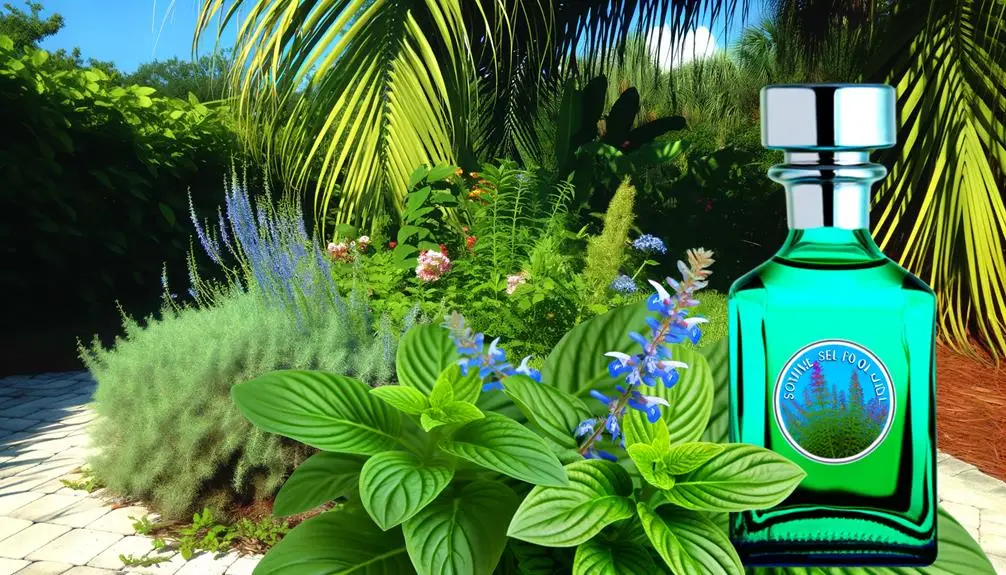
While geraniol proves to be a potent option in pest control, gerinol is another promising compound that warrants attention. This naturally occurring compound, found in various essential oils, showcases notable insecticidal properties and is gaining traction among those seeking eco-friendly pest management solutions. Using gerinol can contribute to more sustainable landscapes in South Florida, aligning with the community’s desire for responsible gardening practices.
Gerinol possesses impressive acaricidal activity, making it effective against various pests, including mites. Homeowners and landscapers can find value in integrating this botanical into their pest control routines. Here’s a quick comparison of gerinol’s benefits:
| Feature | Gerinol |
|---|---|
| Insecticidal Properties | Yes |
| Acaricidal Activity | High |
| Source | Essential Oils |
By incorporating essential oils like gerinol into your pest management strategies, you can reduce reliance on synthetic pesticides. This not only protects your plants but also fosters a healthier ecosystem. It’s a way to guarantee that your gardening practices align with the values of sustainability and community well-being.
Consider exploring the potential of gerinol in your landscapes. As you embrace these botanicals, you’re not just controlling pests; you’re also contributing to a greener, healthier environment for everyone. So, why not give gerinol a try and become part of this positive change?
Soybean oil
Soybean oil has emerged as a valuable player in eco-friendly pest management, offering both insecticidal and repellent properties. If you’re looking for a natural solution to control pests in your garden, you’ll find soybean oil an excellent option. This versatile oil, derived from soybeans, contains essential fatty acids and other components that contribute to its effectiveness against a variety of pests.
When you apply soybean oil, it works by suffocating insects, disrupting their respiratory systems. Its insecticidal properties make it particularly effective against soft-bodied pests like aphids, spider mites, and whiteflies. Additionally, the oil acts as a repellent, making your plants less appealing to these unwanted visitors.
Using soybean oil is straightforward. You can mix it with water and a few drops of dish soap to create an emulsified spray that adheres well to plant surfaces. As you engage with this eco-friendly pest control method, you’ll appreciate its low toxicity to beneficial insects when applied correctly.
Incorporating soybean oil into your pest management routine aligns with a growing community of gardeners who prioritize natural oils over synthetic chemicals. By choosing soybean oil, you’re not just protecting your plants; you’re also contributing to a healthier environment. So, the next time you face a pest problem, consider reaching for soybean oil and join others in embracing sustainable gardening practices.
2-Phenethyl Propionate
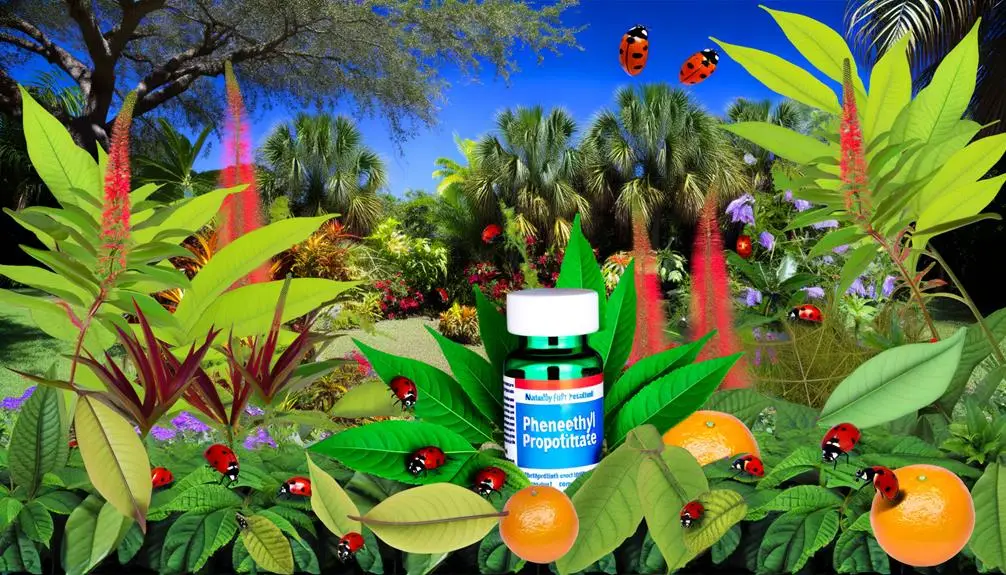
Utilizing phenethyl propionate in your pest management strategy can yield impressive results, especially against soft-bodied insects. This essential oil is gaining popularity for its remarkable insecticidal properties and acaricidal activity, making it a great addition to your pest control toolkit. You’ll find it particularly effective against pests like aphids, mites, and whiteflies that often plague South Florida landscapes.
Here are four key benefits of using phenethyl propionate in your pest control efforts:
- Natural Origin: As a plant-derived compound, phenethyl propionate aligns with eco-friendly pest management practices, ensuring you’re protecting your garden without harsh chemicals.
- Broad-Spectrum Efficacy: Its potent insecticidal properties target a range of pests, providing you with versatile protection for various plants in your landscape.
- Reduced Resistance Development: The diverse action mechanism of phenethyl propionate helps minimize the risk of pests developing resistance, ensuring long-term effectiveness.
- Compatible with Other Treatments: You can easily integrate phenethyl propionate with other essential oils and natural products, enhancing your overall pest management approach.
Incorporating phenethyl propionate into your pest control strategy not only helps you manage unwanted insects effectively but also fosters a sense of belonging to a community that values sustainable gardening practices. By using this natural solution, you’re contributing to a healthier ecosystem while keeping your plants thriving.
Azadirachtin
Azadirachtin, derived from the seeds of the neem tree, stands out as a powerful natural insecticide in pest management. You’re not just using a product; you’re becoming part of a community that values sustainable practices and natural solutions. Azadirachtin offers a unique approach to pest control, working by disrupting the growth and reproduction of nuisances. This means you can protect your plants while being kind to the environment.
When you choose azadirachtin, you’re harnessing the insecticidal properties of a natural oil that’s been trusted for centuries. It targets a wide range of pests, making it an effective choice for gardeners and landscapers alike. Its effectiveness lies in its ability to interfere with the hormones of insects, preventing them from maturing and reproducing. This is especially valuable in South Florida, where pest populations can thrive in the warm, humid climate.
Using azadirachtin in your pest control strategy adds a layer of security that synthetic chemicals can’t provide. You’re not just protecting your garden; you’re fostering a healthier ecosystem. By incorporating this essential oil into your routine, you’re joining a movement that prioritizes health and sustainability. So, whether you’re dealing with stubborn aphids or troublesome caterpillars, azadirachtin can be your ally. Embrace this natural solution, and you’ll see the benefits in your landscapes, along with the satisfaction of contributing to a greener future.
Garlic Juice
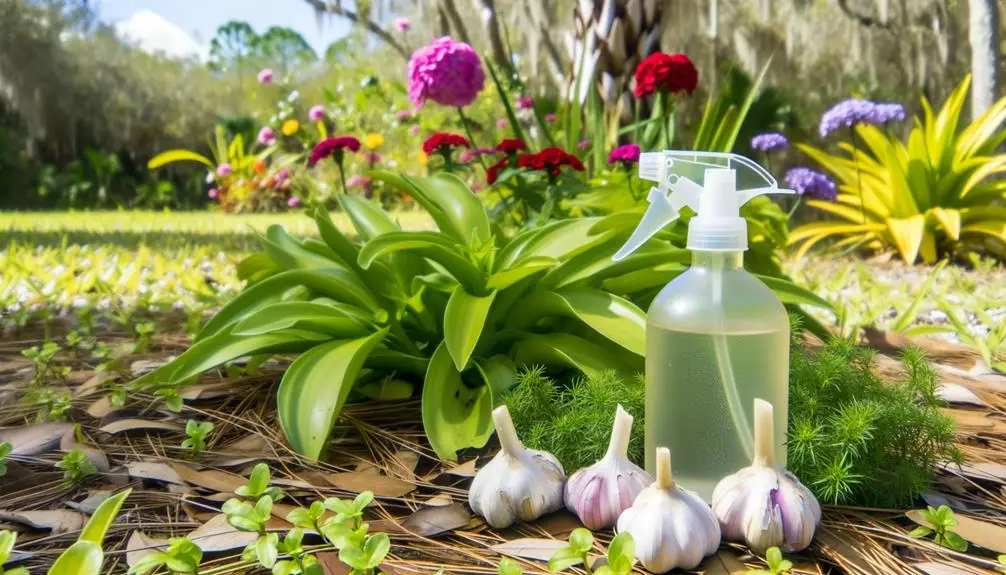
Garlic juice is a potent natural solution for pest control that many gardeners swear by. Its insecticidal properties make it a favorite for those looking to protect their plants without harsh chemicals. This robust juice, derived from garlic, not only deters common pests but also possesses acaricidal activity, effectively combating mites.
Here are four reasons why you should consider using garlic juice in your pest control regimen:
- Natural Repellent: Garlic juice’s strong scent repels a variety of insects, including aphids, beetles, and mosquitoes.
- Harmless for Plants: Unlike synthetic pesticides, garlic juice is harmless to apply on your plants, ensuring they remain healthy while keeping pests at bay.
- Easy to Make: You can easily create your own garlic juice by blending garlic cloves with water, straining the mixture, and using it as a spray.
- Cost-effective: Using garlic juice is a budget-friendly option for pest control, as garlic is an inexpensive ingredient commonly found in kitchens.
Incorporating garlic juice into your garden routine not only helps maintain a pest-free environment but also fosters a sense of belonging within a community that values sustainable practices. By embracing natural oils like garlic juice, you’re joining others who prioritize eco-friendly solutions in their gardening efforts. So next time you face a pest problem, remember that garlic juice might just be your best ally in achieving a thriving landscape.
Cedar Oil
When it comes to natural pest control, cedar oil stands out as a powerful ally. This essential oil, derived from cedar trees, boasts impressive insecticidal properties that make it a go-to choice for many gardeners and homeowners like you. If you’re looking to create a pest-free environment without resorting to harsh chemicals, cedar oil can be your secret weapon.
Cedar oil works effectively against a range of pests, including mosquitoes, ants, and even certain mites. Its unique composition not only repels insects but also exhibits acaricidal activity, targeting those bothersome mites that can wreak havoc in your landscape. By incorporating cedar oil into your pest control routine, you’re choosing a solution that’s both effective and environmentally friendly.
Using cedar oil is simple. You can dilute it with water and spray it directly onto infested areas or mix it with other essential oils to enhance its effectiveness. Many people in your community have found that regular applications help maintain a pest-free zone, fostering a more enjoyable outdoor space for family gatherings and relaxation.
Plus, cedar oil’s pleasant aroma leaves your garden smelling fresh, creating a welcoming atmosphere. By embracing cedar oil, you’re not just protecting your plants; you’re also contributing to a healthier ecosystem. So, join others who’ve discovered the benefits of this remarkable essential oil, and take control of your pest problems with cedar oil today!
Neem Oil
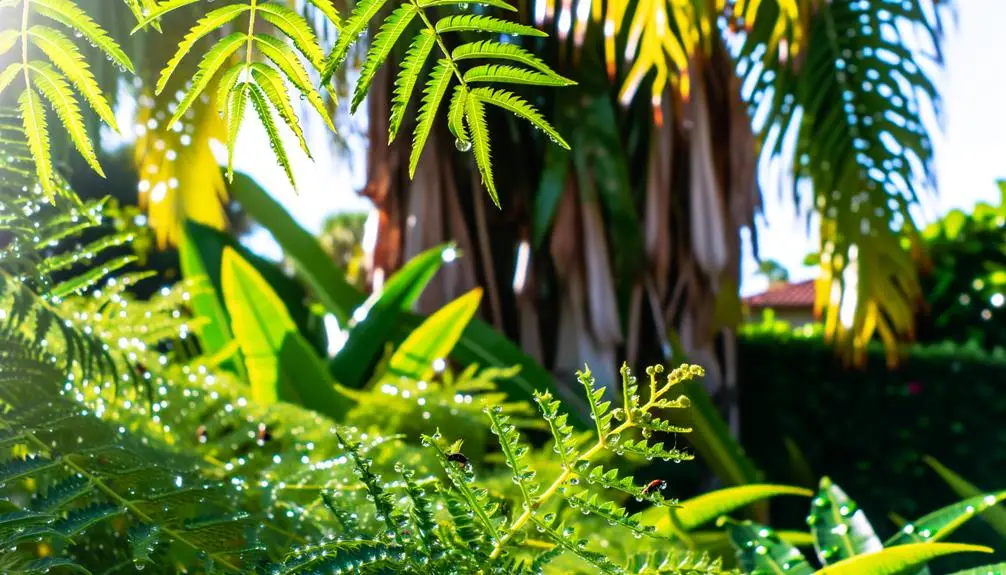
If you’re exploring natural pest control options, neem oil deserves your attention. This powerful oil, extracted from the seeds of the neem tree, is renowned for its insecticidal properties and is a staple in organic gardening. Its unique composition not only repels pests but also disrupts their life cycles, making it an effective choice for maintaining healthy landscapes in South Florida.
Here are four key benefits of using neem oil for pest control:
- Broad Spectrum Efficacy: Neem oil effectively targets a variety of pests, including aphids, whiteflies, and spider mites.
- Acaricidal Activity: It exhibits strong acaricidal activity, helping you manage not just insects but also ticks and mites.
- Harmless for Beneficials: Unlike many synthetic pesticides, neem oil is harmless for beneficial insects like ladybugs and bees, so you can protect your garden’s ecosystem.
- Natural Alternative: As a natural product derived from essential oils, neem oil reduces your reliance on harsh chemicals, promoting a healthier environment.
To use neem oil, mix it with water and a few drops of soap to enhance its effectiveness. Spray it on affected plants, ensuring thorough coverage. With its proven track record in pest control, neem oil can be your ally in creating a thriving, pest-free landscape. Embrace this natural solution, and you’ll contribute to a healthier ecosystem while enjoying the beauty of your garden.
Frequently Asked Questions
Are Natural Oils Safe for Pets and Children in Gardens?
When considering natural oils for pest control, you’ll want to prioritize protection for your pets and kids. Most essential oils can be harmless when used correctly, but some can irritate sensitive skin or trigger allergies. Always dilute oils and apply them in well-ventilated areas. Before using any product, check its specific safety guidelines. It’s best to keep pets and children away from treated areas until they’re completely dry to guarantee everyone stays protected.
How Often Should I Reapply Natural Oils for Pest Control?
When using natural oils for pest control, you should reapply them every 7 to 14 days, especially after rain or watering your garden. This helps maintain their effectiveness. Keep an eye on pest activity; if you notice an increase, it might be time to reapply sooner. Always follow the product instructions for the best results. Staying consistent with your applications will create a welcoming environment for your plants and keep pests at bay!
Can Natural Oils Harm Beneficial Insects Like Bees?
Imagine a garden buzzing with life, where bees flit from flower to flower, gathering nectar. You wonder, can natural oils harm these essential pollinators? While many oils are designed to target pests, they can affect beneficial insects if applied indiscriminately. To protect your buzzing friends, apply oils carefully and during times when bees are less active. You’re part of a community that values balance, nurturing both your plants and the pollinators.
What Is the Shelf Life of Essential Oils for Pest Control?
The shelf life of essential oils for pest control typically ranges from 1 to 3 years, depending on storage conditions. To maximize their potency, keep them in a cool, dark place, tightly sealed. You’ll want to check for changes in color or smell before use, as these can indicate degradation. By being mindful of how you store your essential oils, you’ll maintain their effectiveness for your pest control needs.
How Do I Properly Store Essential Oils to Maintain Effectiveness?
To properly store essential oils and maintain their effectiveness, keep them in a cool, dark place. Avoid direct sunlight and heat, which can degrade their quality. Use dark glass containers, as they protect the oils from light exposure. Make sure the lids are tightly sealed to prevent evaporation. It’s also a good idea to label your oils with the date of opening, so you can track their freshness and potency over time.


